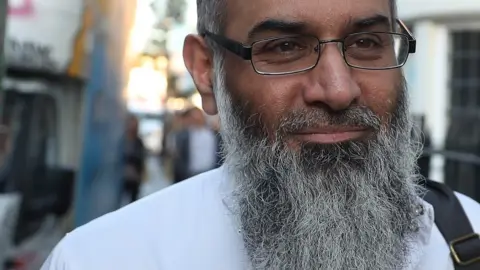'Extremist' Google algorithms concern ex-police chief
 Getty Images
Getty ImagesA former police chief has called on Google to amend its technology to help stop the spread of terrorist material.
Ex-Met Police assistant commissioner Sir Mark Rowley says it is a disgrace a jailed radical preacher ranks top for search term "British Muslim spokesman".
He told BBC Radio 4's Today programme the internet search company's algorithms "pushed readers to extremist material" to maximise ad revenue.
Google denies the claim, saying it aims to steer users to third-party sites.
The top-ranked search referred to by Sir Mark takes users to the Wikipedia entry for Anjem Choudary, who was released from prison last year, halfway through a five-year jail term for encouraging support for the so-called Islamic State group.
He told Today: "I think I mentioned on your programme a few months ago, if you Google 'British Muslim spokesman' you get Anjem Choudary. That's a disgrace."
Hate speech
Sir Mark said: "These algorithms are designed to push us towards contentious material because that feeds their bottom line of advertising revenues, by pushing readers to extremist material."
This is something Google denies, pointing out that it actually wants to get people off the platform and on to a third-party site as quickly as possible.
Neither does it generally show adverts next to news-related enquiries, the BBC was told.
Sir Mark said the scale and pace of all social-media firms' attempts to deal with the problem were "completely insufficient".
The Home Affairs Select Committee grilled executives from YouTube, Twitter and Facebook this week over the amount of hate speech on their platforms.
Yvette Cooper, who chairs the committee, was particularly angry at the amount of far-right content recommended to her on YouTube, questioning why the algorithms did that and whether they could be changed.
YouTube executive Marco Pancini said it was working to make controversial content "less visible".
Police co-operation
But it is not just with regard to Islam that Google's algorithms produce contentious results.
The first result in a search for "UK Christian spokesman" is Christian Voice - an organisation which has called for British law to be based on the Bible, and which opposes abortion, homosexuality and compulsory sex education.
MPs asked the three social-media firms, Twitter, Facebook and Google, how they responded when they found users who were sharing propaganda.
All three said they would give information on users to police only if there was "an imminent threat of risk to life".
Sir Mark told the Today programme that the firms needed to do more to pass on any information they had about terrorist material being shared on their platforms.
